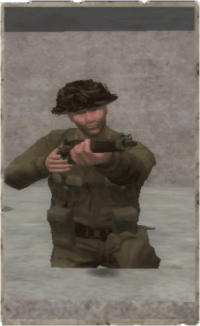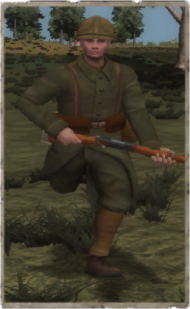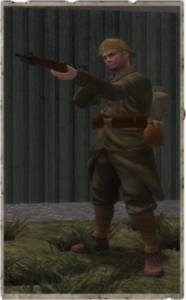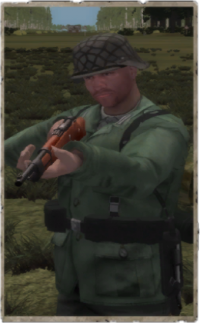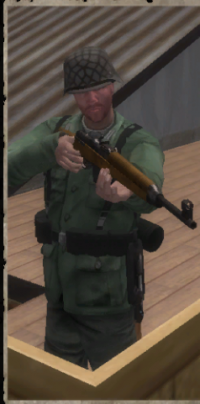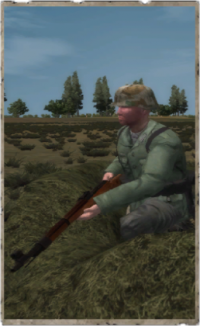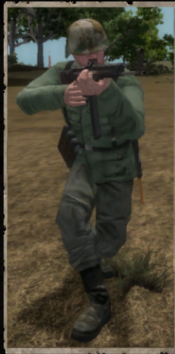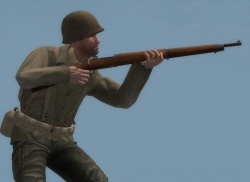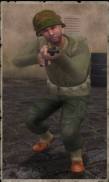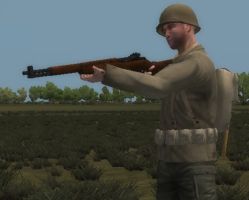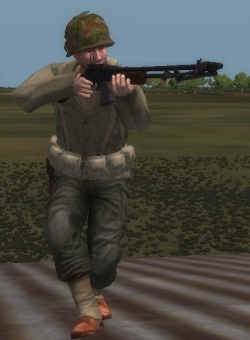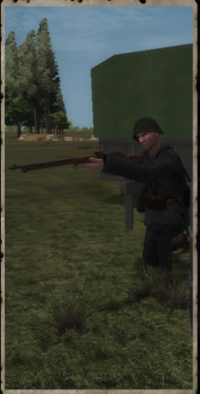Overview & Game Play
Although more advanced weapons were fielded, the humble bolt-action rifle remained one of the most common infantry weapons throughout the war. Its long range and accuracy made it a versatile weapon that was suitable for any kind of battlefield, from close building-to-building fighting to battles in the countryside, and the simple design made them durable, easy to produce in large numbers, and easy for any soldier to use with minimal training.
The biggest drawback you'll encounter is the rifle's extremely low rate of fire: With around a full second to chamber another round, every shot needs to count. Except for the LMG, most faster-firing weapons tend to be somewhat impotent at longer ranges, but this drawback becomes brutally obvious in close-quarters fighting where even a meager pistol has an advantage. In these situations, the cautious rifleman is the victorious one: Rushing around a corner will get you cut down before you even get a shot off.
In addition to their rifle, each rifleman carries four HE grenades, two smoke grenades, and a combat knife. Bolt action Riflemen are also equipped with one HE Satchel Charge. Riflemen are also equipped with an ammo resupply pack that they can use to help support infantry such as machinegunners and mortermen.
Equipment
British
When first developed by the Royal Small Arms Factory at Enfield by J.P Lee in 1895, the Lee-Enfield was a novel marriage between a bolt-action and fixed-magazine rifle. They were first carried into action by British troops in the Boer War of 1898. Later versions absorbed useful lessons from the Mausers carried by their opponents, and the rifle saw universal service in WW1. By the time the gun had reached revision 4 during WW2, the weapon had been optimized thoroughly both for soldiers use and for mass-production. Millions of Lee-Enfields were produced over its 60 year production span.
This rifle is accurate, hard-hitting, and fast firing. The ample magazine is double that of the French or German battle rifles, and is a major advantage in the split-seconds of combat. It is considered one of the legendary great battle rifles of all time. The peep sights make it extremely easy for even a novice to use, and you should be able to reliably hit targets at 300+ meters with a little practice.
French
WW1 convinced the French military that the 8mm Lebel cartridge needed to be replaced. Many choices were tested, with the final choice being the 7.5 x 54mm MAS round. This testing process and entirely new rifle design meant that the Fusil MAS. 36 was the last bolt action rifle adopted by a major army anywhere in the world.
Its receiver was based around a much-modified and shortened Mauser bolt action. Although it was regarded as an ugly and clumsy weapon, it could stand up to virtually any sort of abuse known to man, from surviving explosions to being used as an improvised club or crowbar.
German
Accepted in 1935 as a relatively simple shortening of the WW1 Gewehr 98 rifle, the Karbiner 98k was a serviceable weapon that performed well in varied conditions. Resistant to fouling and inherently accurate well past 500m, the gun was easily converted to sniper use by simply attaching a scope.
It remained the standard German service weapon until the end of the war with few modifications.
As the tiers progress Semi-automatic rifles, as does the automatic rifle the STG44, becomes available to the German army.
American
Italian
The Italian rifleman is one of two Italian units currently in game. Armed with a Carcano rifle and can be found in the German spawn list.
